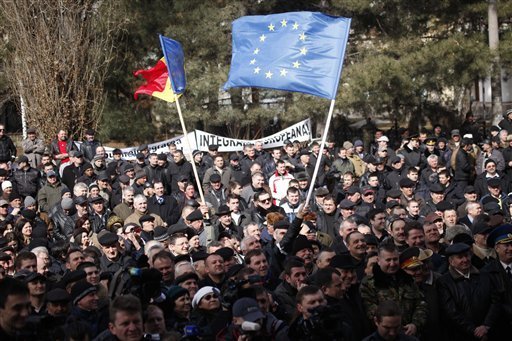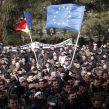
Moldova: A Democracy Promoter’s Dream and Nightmare
Publication: Eurasia Daily Monitor Volume: 9 Issue: 54
By:

In theory, and even by certain practical criteria, Moldova should qualify as Exhibit One for successful democracy promotion in non-western societies. All elections held in Moldova from 1991 to date were internationally certified as free and fair (“democratic process”). Indeed, the opposition defeated the incumbents in most elections (“alternance in power” and “orderly transfer of power.”) All inhabitants received the rights of citizenship automatically, without length-of-residency or language qualifications for members of ethnic minorities (“zero option” ever since 1991). At times, parliaments and parliament-based governments competed with the heads of state; whereas at other times, parties of governing coalitions competed against each other (local versions of “checks and balances”). Moldova is a parliamentary republic and a receptive pupil of European democracy-building institutions. They closely vetted Moldova’s constitution (adopted in 1994, amended in 2000) and are continually mentoring Moldova on current legislation and governance.
In Moldova’s specific circumstances, the introduction of “electoral democracy” with parliamentary government and feeble executive power produced results opposite to those intended. First, it leveled the playing field for the Communist Party’s return to power and influence. Following the party’s re-legalization, the Communists won majorities or pluralities in all parliamentary elections (1998, 2001, 2005, April 2009, July 2009, November 2010). Non-communist coalitions foundered (2000, 2005-2006, 2010) on inter-party rivalries and corruption scandals. Since such coalitions described themselves as democratic, the credibility of the concept itself took heavy hits.
The Communist Party regained a monopoly on power in 2001 after three years of parliamentary chaos, which played into the Communists’ hands. President Vladimir Voronin inherited a parliamentary republic but operated it de facto as a presidential republic, with a Communist parliamentary majority until 2009. For all its Soviet veneer, the rule of Voronin and his communists was essentially a patriarchal system. It rested partly on popular deference to executive authority, and partly on local interest groups sharing in the (all-too-modest) spoils of governance. Moldovan voters showed scant interest in democracy. Russian president/prime minister Vladimir Putin consistently topped Moldova’s popularity ratings, ahead even of Voronin.
In April 2009, the Communists won the parliamentary elections again, in an internationally supervised free and fair “process.” They garnered 60 parliamentary seats, out of 101; but needed 61 seats in order to elect the head of state. The Communists proposed a non-communist (then-prime minister Zenaida Greceanai, a non-party financial expert) for head of state. The opposition refused to cooperate, forcing the parliament’s dissolution and new elections in July that year. The Communists won a plurality again; but the Alliance of European Integration (AEI) of three parties collectively outvoted the Communist Party and formed a new government in September that year.
An “orderly transfer of power” occurred on the Communist side. On the opposite side, however, twitter-mobilized youth crowds invaded and set fire to the “communist” parliament and presidential buildings in Chisinau; the buildings have yet to be repaired as Moldova can apparently not afford the costs. International media enthused over “Moldova’s twitter revolution” in 2009 and referenced it again in 2011 as a harbinger to the twitter-driven “Arab Spring.” This response rested in both cases on a misunderstanding of local societies.
The shift from Communist to AEI government brought with it a tradeoff of benefits and costs. One major benefit is simply the non- or anti-Communist identification of the government. This enhances the credibility of Moldova’s European orientation (less credibly introduced by the Communists as state policy in 2003) and qualifies Moldova’s government and its leaders for closer relations with Brussels. Internally, the main benefit thus far is destruction of the Communist Party’s resources for patronage, thus precluding a 1998- or 2001-style Communist revanche (or 2009-style Communist continuity). Minimizing Communist political influence is a double gain for Moldova since the party’s shift in 2010 to an overtly Russia-oriented foreign policy.
On the cost side, the introduction of parliamentary government in Moldova through the AEI has disorganized an already weak state. The state presidency has been technically vacant for almost three years. Since April 2009, Moldova has held three parliamentary elections, seven presidential election attempts (all falling short of the necessary majority in parliament), and a constitutional referendum (failed due to insufficient voter turnout). On March 16, the parliament undertook the eighth attempt in less than three years to elect the head of state, failing which the dissolution of parliament and yet another round of elections could no longer be avoided (it had been avoided in breach of the constitution thus far) (Moldpres, March 13-16).
The premature introduction of parliamentary government, and enfeeblement of executive authority, has not brought democracy to Moldova. Instead, it is associated with a dysfunctional state. If anything it has retarded the evolution toward development of democratic institutions over time, in a society that never experienced democracy (or, for that matter, effective statehood) in its history. Moldova’s full readiness to learn and apply democracy must rank (compared with other places) as a democracy-promoter’s dream, but the forms of its practical application could inspire a democracy promoter’s nightmare.




